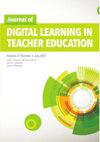运用计划行为分解理论探讨影响教师整合数字素养意愿的因素
Q1 Social Sciences
Journal of Digital Learning in Teacher Education
Pub Date : 2020-02-12
DOI:10.1080/21532974.2020.1719244
引用次数: 30
摘要
摘要本研究基于计划行为分解理论(DTPB),探讨了影响教师将数字素养融入课堂的因素。通径分析用于分析通过在线调查收集的定量数据(n = 144)和恒定比较方法来分析开放式调查的回答。研究结果显示,DTPB的组成部分——态度、主观规范和感知行为控制——解释了教师将数字素养融入课堂的意图的显著差异。此外,积极的态度、感知的有用性和自我效能感是教师将数字素养融入课堂意图的最强指标。其他研究结果表明,教师意识到数字素养对提高学生21世纪的技能以及为他们的大学和职业生涯做好准备的好处。本文章由计算机程序翻译,如有差异,请以英文原文为准。
Exploring factors that influence teachers’ intentions to integrate digital literacy using the decomposed theory of planned behavior
Abstract This study explored factors that influence teachers’ intentions to integrate digital literacy into their classrooms based on the Decomposed Theory of Planned Behavior (DTPB). Path analysis was used to analyze quantitative data collected through an online survey (n = 144) and constant comparison approach was used to analyze open-ended survey responses. Findings revealed that the components of the DTPB–attitude, subjective norms and perceived behavioral control–explained significant variance in teachers' intentions to integrate digital literacy in their classrooms. Also, positive attitude, perceived usefulness, and self-efficacy are the strongest indicators of teachers’ intentions to integrate digital literacy into their classrooms. Additional findings indicate that teachers perceive the benefits of digital literacy for improving students’ 21st century skills and preparing them for college and professional careers.
求助全文
通过发布文献求助,成功后即可免费获取论文全文。
去求助
来源期刊

Journal of Digital Learning in Teacher Education
Social Sciences-Education
CiteScore
4.90
自引率
0.00%
发文量
15
 求助内容:
求助内容: 应助结果提醒方式:
应助结果提醒方式:


